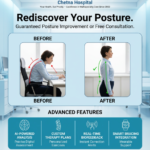Menstruation is a natural part of a woman’s life, but for many, it comes with uncomfortable symptoms – especially period pain, also known as dysmenorrhea. Studies suggest that over 50–70% of women experience cramps during their periods, and for some, the pain is so intense that it affects daily life, work, or studies.
The good news is that painful periods can often be managed with simple lifestyle adjustments, home remedies, and medical care when needed. In this article, we’ll explore what causes period pain, different types of dysmenorrhea, and practical tips to reduce discomfort naturally and effectively.
What is Dysmenorrhea?
Dysmenorrhea is the medical term for painful periods. It usually presents as cramping in the lower abdomen, back, or thighs.
Types of Dysmenorrhea:
- Primary Dysmenorrhea – Pain caused by natural contractions of the uterus during menstruation. It usually starts in teenage years and may improve with age or after childbirth.
- Secondary Dysmenorrhea – Pain linked to underlying medical conditions like endometriosis, uterine fibroids, adenomyosis, or pelvic inflammatory disease. This type tends to worsen over time and requires medical evaluation.
Why Do Periods Cause Pain?
Menstrual cramps occur because the uterus contracts to shed its lining. This process is triggered by hormone-like substances called prostaglandins. Higher levels of prostaglandins are associated with more severe cramps, nausea, diarrhea, and headaches.
Other contributing factors may include:
- Hormonal imbalance
- Stress and poor sleep
- Sedentary lifestyle
- Diet high in junk food, sugar, and caffeine
Tips for Managing Painful Periods
1. Apply Heat Therapy
Heat is one of the most effective natural remedies for cramps. A heating pad, hot water bag, or even a warm bath can help relax the muscles of the uterus, increase blood flow, and relieve tension.
👉 Tip: Apply heat to your lower abdomen or back for 15–20 minutes several times a day.
2. Stay Hydrated
Dehydration can worsen cramps and bloating. Drinking enough fluids helps reduce water retention and eases muscle contractions.
- Aim for at least 8–10 glasses of water daily.
- Warm water and herbal teas (ginger, chamomile, peppermint) work best.
- Avoid excessive caffeine and alcohol as they may trigger dehydration.
3. Exercise Regularly
While exercise may be the last thing you feel like doing during periods, physical activity releases endorphins – natural pain relievers.
- Light stretching, yoga, walking, or cycling can improve circulation and reduce cramps.
- Specific yoga poses like Child’s Pose, Cat-Cow Stretch, and Reclined Bound Angle Pose are especially soothing.
👉 Regular exercise outside of periods also helps regulate cycles and reduces long-term menstrual pain.
4. Eat a Healthy, Balanced Diet
Food plays a vital role in managing dysmenorrhea.
- Include fruits, vegetables, whole grains, nuts, seeds, and omega-3-rich foods (salmon, flaxseeds, walnuts).
- Limit refined sugar, processed foods, salty snacks, red meat, and fried foods that can worsen inflammation.
- Magnesium-rich foods (spinach, pumpkin seeds, dark chocolate) may relax muscles.
👉 Maintaining a nutrient-rich diet throughout the month reduces period-related discomfort.
5. Practice Stress Management
Stress can amplify pain perception and disrupt hormonal balance. Managing stress helps improve overall menstrual health.
- Try meditation, deep breathing exercises, or progressive muscle relaxation.
- A warm bath with essential oils like lavender or peppermint can also reduce stress.
- Ensure 7–8 hours of quality sleep each night.
6. Over-the-Counter (OTC) Pain Relief
For moderate cramps, non-steroidal anti-inflammatory drugs (NSAIDs) like ibuprofen can reduce pain by lowering prostaglandin levels.
👉 Important: Take medication only as prescribed and avoid excessive or frequent use.
If OTC painkillers don’t help, consult your gynaecologist.
7. Alternative Therapies
Several natural therapies can complement conventional approaches:
- Acupuncture – May improve blood flow and reduce uterine contractions.
- Aromatherapy – Essential oils like lavender, clary sage, or rose oil may ease stress and cramps.
- Massage Therapy – Gentle massage of the lower abdomen with warm oil helps relax tense muscles.
8. Track Your Menstrual Cycle
Using period-tracking apps helps you understand your body better. By logging symptoms, you can identify triggers and prepare in advance with heat packs, herbal teas, or medications before the pain peaks.
9. Know When to See a Doctor
Sometimes, painful periods are not just a normal part of menstruation. Seek medical advice if:
- Pain is severe and not relieved by home remedies or OTC medications
- Cramps interfere with daily life, work, or sleep
- Periods are unusually heavy, irregular, or associated with clots
- Pain worsens with age instead of improving
These could be signs of underlying conditions like endometriosis, fibroids, PCOS, or pelvic infections.
Medical Treatments for Severe Dysmenorrhea
If lifestyle changes don’t help, your gynaecologist may recommend:
- Hormonal birth control (pills, patches, or intrauterine devices) to regulate cycles and reduce cramps
- Surgical options (in cases of fibroids or endometriosis)
- Specialized therapies based on diagnosis
Early medical consultation prevents complications and improves quality of life.
Preventive Lifestyle Tips
- Maintain a regular sleep schedule
- Exercise at least 30 minutes, 4–5 days a week
- Reduce junk food and processed sugar
- Manage stress with yoga or mindfulness
- Schedule annual gynaecological check-ups for preventive care
Conclusion
Painful periods (dysmenorrhea) are a common experience, but they should not be accepted as “normal suffering.” With the right balance of home remedies, healthy habits, and medical care, you can manage cramps effectively and improve your quality of life.
Remember: If your period pain is severe, persistent, or affects daily functioning, don’t ignore it – consult a gynaecologist.
🌸 At Chetna Hospital, our specialists provide compassionate and expert care for women’s health at every stage of life. From adolescent health to reproductive care and menopause support, we’re here to help you live pain-free and healthy.













